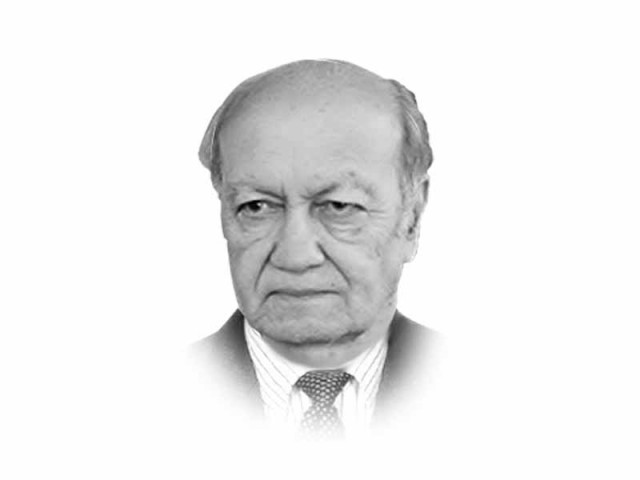Prioritising science and technology
Pakistani government must accord the highest priority to science and technology

The writer is a retired lieutenant general of the Pakistan Army and a former federal secretary. He has also served as chairman of the Pakistan Ordnance Factories Board
The Chinese leadership too fully realises that if it were to achieve its millennium development goals these would only be possible if it were to relentlessly pursue in building a strong scientific and technological base and maintaining it. For the last several decades Chinese students, usually the brightest, are sent abroad, especially to the US and Western Europe, to study in their most reputed universities. Majority of the students opt for science and engineering subjects and return to serve their country. This is how China has been building its human resource to compete and excel in the world.
A recent report in The Washington Post/Bloomberg indicates that China is making determined efforts at overtaking the US in scientific research — “The government made an increasingly concerted effort to build the scientific base to provide another vector for growth. The results of those efforts are showing up in both the ranking of Chinese universities (11 of the top 100 globally) and in scholarly output.” China’s contribution to global scientific output has increased manifold in the last few years. Even if the Chinese quality of research were currently inferior to that of the US with their dogged determination they would catch up in the years ahead.
Successive Indian governments have also laid great emphasis on S&T and encouraged their students to benefit from the academic excellence of some of the top universities of North America, such as, Stanford, McGill and MIT, etc. Not surprising that Indian students now constitute probably the largest component of foreign students. One has to give credit to the foresight of leaders like Nehru who chose to prioritise on benefiting from the US in education than seeking military assistance as we did from 1950 to the 1980s.
India has excelled in the field of IT and ranks among the five top startup countries in the world. America’s leading software giants Microsoft and Google have Indian-Americans heading them.
South Korea is another brilliant example of a country where its leaders by prioritising science and engineering became one of the leading economic powers. In the early 1950s South Korea’s per capita income was about the same as that of Pakistan. Now it is nearly six times higher and is a ranking member of G-20 countries with flagship products in the field of electronics, automobiles and civil nuclear plants.
An area we seriously need to reexamine is national priorities. The question needs to be deliberated is, can Pakistan achieve a higher level of economic progress, social cohesion and political stability without a sound educational and scientific base? Are our priorities in allocation of the nation’s meagre resources ever liberate us from the debt trap? Pakistan’s lack of investment in education and all human development has mainly contributed towards the current state of decline. The type and quality of education being imparted does not promote original thinking. In this all governments have been neglectful or shown their helplessness. As economic pressures piled up their emphasis was on wading through the economic mess rather than focus on education. Other weakness is that students are encouraged to learn by rote rather than through critical thinking. This goes against the very spirit of science.
While the new government justifiably is focusing on the immediate challenge of handling the impending economic crisis, it should soon address human resource development of which science and technology is a critical component.
Falling exports and increasing reliance on imports is a manifestation of Pakistan’s inability to keep pace with technological advancements.
The neglect of the Pakistan Steel Mills and several other technical enterprises like the HMC and Machine Tool Factory was a classic case of how successive governments have mismanaged these assets and turned them into huge loss-running enterprises. These entities were also used as parking places for unwanted technocrats and managers, and to accommodate favourites without consideration of their qualifications. One of the major tasks of this government will be to take stock of these bleeding organisations either by disposing them or restructuring their financial and technical areas.
CPEC provides an additional opportunity for advancing the country’s technological base provided we are willing to create an infrastructure to assimilate the technologies that are associated with the new projects. Another reason for the lack of development of science and engineering is how society respects and treats its scientists and engineers. In countries where feudal mindset reigns supreme and where custodians of state authority, whether it is the civil service, police or the military, embody state power and can use it relatively with ease scientists and engineers are pushed in the background. It is not sheer coincidence that leading economic and military powers are countries that have consistently promoted science and technology and value these professions and are continuously engaged in ensuring their excellence.
We have only adored one class of scientists or engineers and that too who were in the forefront of our nuclear programme. It was more of an appreciation of the product that they produced and less as a respect to the knowledge and expertise they held. The scientists and engineers of PAEC and AQ labs did considerable original scientific research and applied most sophisticated engineering skills in establishing the nuclear infrastructure. This shows if Pakistani scientists and engineers receive quality education and are provided an amiable environment they could perform as well as their counterparts abroad and contribute to nation-building. This transformation would require a reformed educational system, cultural change and a different mindset.
Published in The Express Tribune, September 19th, 2018.
Like Opinion & Editorial on Facebook, follow @ETOpEd on Twitter to receive all updates on all our daily pieces.
















COMMENTS
Comments are moderated and generally will be posted if they are on-topic and not abusive.
For more information, please see our Comments FAQ